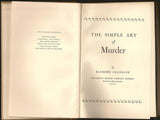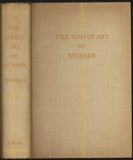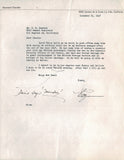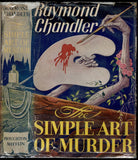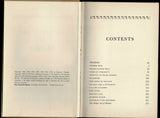Simple Art of Murder
Author: Raymond Thornton Chandler (1888-1959) with signed letter to his agent
Year: 1950
Publisher: Houghton Mifflin Company
Place: Boston
Description:
x+533 pages. Octavo (8 1/4" x 5 3/4") bound in original publisher's beige cloth with brown lettering to spine and cover in original pictorial jacket. First edition. With signed letter laid in.
signed "Ray," one page, 8.5 x 11, personal letterhead, December 31, 1947. Letter to "Swanie," his literary agent H. N. Swanson, in full: "David Tyler tells me he wrote to your office some time back saying he probably would not be my business manager after the end of the year 1947. He had some idea of taking a consular post with the British government (during the war he was Consular Security Officer at San Pedro), but this has fallen through due to great retrenchment in the British Foreign Service and on account of the dollar shortage. So he will be going on with me exactly as before. I expect to be in Los Angeles next Monday and believe I have to be in court Tuesday morning. After that I will go and see Joe. Happy New Year!" Next to his signature, Chandler writes in his own hand: "Davis says 'Monday.'"
The Simple Art of Murder is hard-boiled detective fiction author Raymond Chandler's critical essay, a magazine article, and his collection of short stories. The essay was first published in The Atlantic Monthly in December 1944. The magazine article appeared in the Saturday Review of Literature, April 15, 1950. The article, somewhat rewritten, served to introduce the collection The Simple Art of Murder, 1950 (Houghton Mifflin Co.), which contained eight of Chandler's early stories pre-dating his first novel, The Big Sleep. The essay is considered a seminal piece of literary criticism. Although Chandler's primary topic is the art (and failings) of detective fiction, he touches on general literature and modern society as well. Chandler reserves his praise for Dashiell Hammett. Although Chandler and Hammett were contemporaries and grouped as the founders of the hard-boiled school, Chandler speaks of Hammett as the "one individual... picked out to represent the whole movement," noting Hammett's mastery of the "American language", his adherence to reality, and that he "gave murder back to the kind of people that commit it for reasons, not just to provide a corpse."
Condition:
Spine ends rubbed with a few minor splits, some age toning to edges. Jacket spine sunned, edge wear with some small chips and closed tears and creases, some tape repairs to verso, spine head chipped with tape repair else a very good copy in about a very good jacket. Signed letter with fold creases else near fine.








